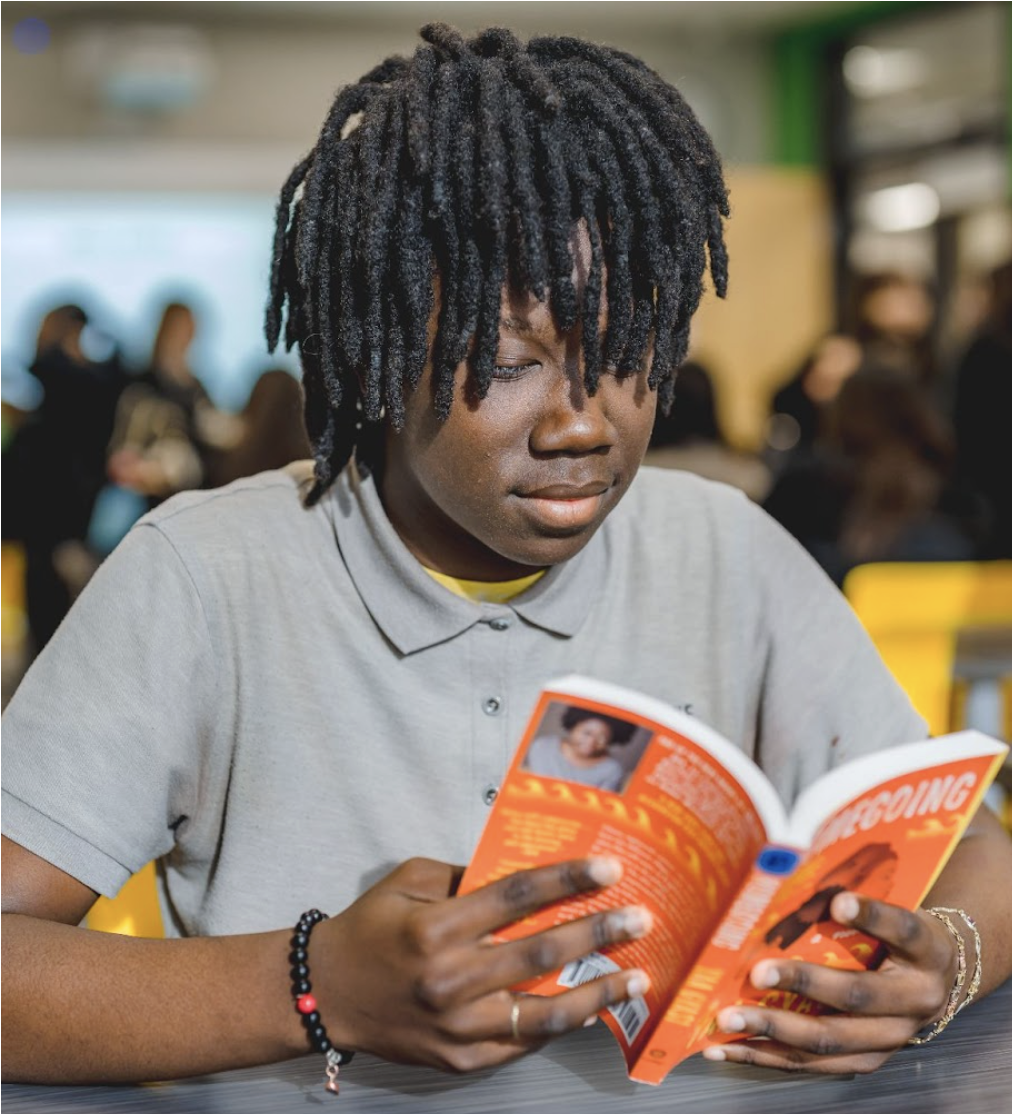Feedback That Emboldens Adolescent Readers

A couple of weeks ago, I described how a ninth grade student became more and more engrossed in a challenging book by practicing reading it aloud. I showed that, as David (not his real name) pointedly emphasized certain words and phrases and made better use of the text’s punctuation, his voice sharpened from monotonous to curious to concerned, and he had insights into the text.
In order to make this progress, David had to practice reading the same sentences aloud over and over again. To motivate every adolescent reader to practice reading aloud enough to make progress, the Riveting Results curriculum and software present reading challenges that students can master in 5 to 10 minutes. By recording their voices and comparing recordings, students quickly hear when they are making progress. A scorer’s expert feedback confirms that feeling and moves them on to the next challenge or guides them to do better next time. Let’s examine how that feedback caused David to dig deeper and forge a stronger connection to the text that he was reading.
The feedback, first of all, was timely. By the next class, David could read the feedback and respond to it. In order to make this cycle possible for an English teacher managing 125 to 180 students a day, Riveting Results hires retired teachers to help the classroom teacher read and respond to students’ fluency recordings remotely.
The feedback was also authentic, and sparked an emotional response from David. Below I have included the comments that David received on his fluency recordings between August 1 and August 3. Notice how David’s desire to prove to the listener that he knew how to read with appropriate emphasis drove him to express more precisely the emotions embedded in the text.
After he submitted this recording on August 1, David received an X (telling him that the recording was not successful) and the following feedback:
“Your voice sounds the same for the entire passage. Make one sentence sound different by using emotion to make it stand out from the rest.”
The next morning, in his written response, David said that he agreed with the feedback “because I didn’t do good on it,” and that he would focus on “doing better and making my voice pop out more.”
Despite his stated commitment to do better on his next fluency recording, David received an X again.
The teacher told him: “I couldn’t hear distinct panic in your voice. Read the entire passage, but make one to two sentences stand out by sounding more panicked than any of the other sentences you read.”
David thought that his scorer was incorrect. He wrote back that “I had emphasize [sic] in my voice and even my teacher said that there is some panic in my voice.”
Notice that David has shared his recordings with the teacher in the room, soliciting feedback from a listener he trusts. And David felt that “some panic” should be enough for a check mark, but when asked what he would do on his next recording, he stated, “Do better.” He has accepted a standard for reading that goes beyond his own classroom.
We know from watching hundreds of hours of students practicing fluency that the teacher’s presence in the classroom and their interest in the student’s work is a key part of the feedback, letting the students know immediately (even more quickly than the remote scorer) that their hard work and expressive reading captures the attention of someone nearby.
On David’s third recording, he successfully channeled the author’s voice, adopting an appropriately concerned and skeptical tone.
The scorer responded by writing, “I heard you express curiosity at the end of the passage. I wanted to hear more of this passage!”
David argued that he was right about recording number 2: He had expressed some panic, and perhaps that should have been enough for a check mark. However, the expert scorer prodded David to read with more emotional intensity to reach the benchmark. Ultimately, David trusted this expert feedback and kept practicing. When he delivered a proficient recording on the third try, he discovered that she was hooked—eager to hear more of his recordings. In addition to being timely and authentic, it is key that this feedback be expert. This scorer listens to hundreds of recordings a week and has a carefully honed understanding of which recordings reach the threshold of proficiency.
This quick, straightforward, targeted, and authentic feedback enabled David to put aside his old habit of reading complex text too quickly, without emphasis or emotion. It inspired him to try for not only a check mark, but also to impart his personal stamp on his fluency recordings. Ultimately, he could point proudly at the impact that his insightful recording had on his teacher and the remote scorer.
We want to know what you think.
We recommend you read these next
Meet The Team
The Riveting Results program works because it incorporates feedback from dozens of educators experienced in the classroom and in running schools. Unlike other programs that primarily use academic experts to review materials, Riveting Results gets feedback from educators who have actually used Riveting Results in the classroom to develop students reading and writing performance.
contact us



































